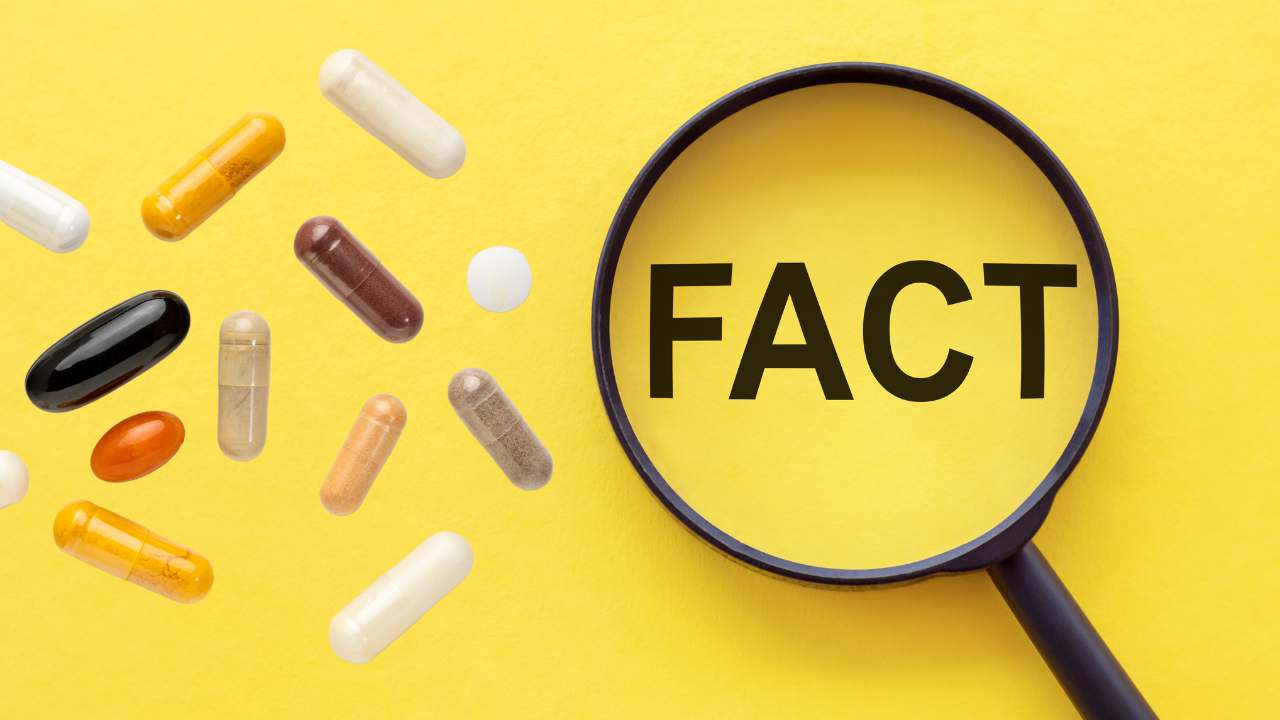A renewed focus on health and wellbeing has emerged in the wake of the COVID-19 pandemic, as people work to fortify their defences against this worldwide epidemic. As a result, sales in the US market reached $35.6 billion in 2021, thanks to an unprecedented 12.1% growth in the vitamin and supplement industry in 2020. However, many people still have misconceptions when they talk about vitamins and supplements, which makes them wonder if they are really helpful, even though the popularity of these products is on the rise. By tackling 18 common myths and rebutting them with scientific proof and pertinent facts, this essay seeks to offer factual information regarding vitamins. The health and safety of our customers is our number one concern as wellness and health experts.
Common Myths About Supplements
The Food and Drug Administration does not oversee dietary supplements
In spite of widespread assumptions to the contrary, dietary supplement labelling and safety are subject to stringent rules imposed by the US Food and Drug Administration (FDA). In 1994, the Dietary Supplement Health and Education Act1 created the recommendations, and these regulations contain penalties for non-compliance. The industry was subject to more regulation after the passage of the Food Safety Modernization Act 2 in 2011. The Food and Drug Administration has issued rules that all supplement manufacturers and suppliers of ingredients must follow:
To ensure that their supplements meet stringent quality control standards, they must: • register with the FDA; • have their facilities inspected regularly; and • get third-party certifications.
• Report any complaints from customers about unexpected side effects to the FDA so that they can keep an eye out for possible issues with dietary supplements.
It is against the law to sell dietary supplements for the purpose of treating, diagnosing, preventing, or curing diseases, unlike medications. Hence, medical professionals need to keep an eye on their use.
All-Natural Supplements Are Safe
Consider elderberries as an example of something that just because something grows naturally doesn’t mean it’s safe to eat. While elderberries in their cooked form provide no health risks, the glycosides found in raw elderberries and other parts of the plant are toxic when consumed because they can turn into cyanide. Array of three Not only is this an outlier, but there’s more evidence to suggest that myth #2 is unfounded and even dangerous. Simply put, “natural” supplements can have harmful interactions with both prescription and over-the-counter medications. Since this is the case, you should consult your physician and/or pharmacist before adding more vitamins or supplements to your diet.
Probiotics and prebiotics have the same positive effects on all people
Without a doubt, the microbes in our digestive tract are vital to our general well-being. However, it’s not uncommon for these supplements’ marketing claims to be overstated. Supplements containing probiotic or prebiotic bacteria have not been well studied in terms of their potential beneficial effects on health. Scientific research has shown that these supplements can alleviate symptoms of irritable bowel syndrome (IBS) and antibiotic-induced diarrhoea.
Dietary Supplements Are Not a Replacement for a Healthy Diet
In terms of the many benefits it gives, a nutritious diet consisting of a variety of whole foods is irreplaceable, regardless of how convincing marketing claims may be. Try asking yourself if your body really absorbs vitamin supplements instead of taking this myth at face value. There are two sides to the argument: positive and negative. Vitamins that are soluble in water are absorbed in part by the body and excreted in part by the urine. The good news is that adipose tissues hold onto fat-soluble vitamins.
Since dietary intake alone may not be sufficient to address deficiencies caused by things like lifestyle, genetics, aging, or chronic illness, it is best to consult with a doctor or pharmacist after a comprehensive examination to determine if a supplement regimen is necessary. Because everyone’s body has different nutritional needs, it’s best to proceed with care and not believe everything you read while researching dietary supplements.
Buying Supplements Online Is 100% Safe
It doesn’t matter where you buy your vitamins; quality varies. In accordance with FDA rules, premium supplements are manufactured utilising rigorous production methods, scientifically proven doses, and high-quality raw ingredients. Unfortunately, some manufacturing companies take corners, which results in items that aren’t up to par or don’t work as intended. That is why it is so important for consumers to do their homework, read labels thoroughly, and only buy from trusted vendors.
Taking more vitamins will make you stronger
There is no evidence to support the claim that taking more vitamins and supplements will have any kind of beneficial effect. There is a real danger to one’s health when taking dietary supplements in excess of the recommended dosage. For example, different products have different methods of vitamin absorption. Vitamins that are soluble in fat are stored in the body and, in high doses, can be toxic. Although overconsumption may cause negative consequences, water-soluble vitamins do not accumulate in the body. You should always take a vitamin or supplement exactly as directed on the label. Consult a medical professional or pharmacist for advice if you need it.
You Will See Results Right Away With Supplements
Thanks to the ease of online shopping and the availability of next-day and overnight delivery choices, we have grown accustomed to instant gratification in today’s culture. Still, you usually need to be patient to get the results you want from supplements. To find out how long it will be before you notice benefits, it’s best to consult your pharmacist or read up on clinical studies. It is realistic to expect results to be obtained within a comparable timeframe if the trial period was two months.
Taking a Multivitamin Is Better Than Buying Individual Vitamins
Thirteen different vitamins and minerals, including A, C, D, E, and K, are usually found in a basic multivitamin. But there are individual differences, and things like lifestyle, age, gender, or chronic illness could affect how much of a certain vitamin or mineral supplement a person needs. In addition, there is no guarantee that a person will be able to absorb a multivitamin because this depends on a number of factors, including their age and digestive capacity, as well as the particular vitamin in question. Remember the last time we talked about myth #4? Before starting a supplement program, it’s best to talk to your doctor or pharmacist to find out if you need a multivitamin or if your body has any vitamin deficiencies.
Taking Vitamins Alone Made a Bigger Difference
Keep in mind that supplement quality varies from brand to brand and that there is no one-size-fits-all rule for when and how to take supplements. For dosing directions, always refer to the product’s label, and if in doubt, ask your pharmacist for clarification.
Supplements Are Safe to Use with Prescription Drugs
There is no truth to this assertion at all. Before beginning a new medication, it is essential to discuss any supplements you are taking with your doctor or pharmacist. The same goes for taking dietary supplements.
You can’t tell the difference between different supplement brands
This assertion is also unfounded and easily debunked by looking at the ingredient lists of different supplement manufacturers. There are both trustworthy and questionable supplement makers out there, so it’s smart to do your homework before settling on a brand. If you need help deciding, your pharmacist is a great resource.
When and how you take your vitamins doesn’t matter
Like prescription drugs, some dietary supplements and vitamins work better when taken at certain times. The type of vitamin has a significant impact on how well it is absorbed. For example, it is beneficial to consume fats or oils with fat-soluble vitamins like vitamin E since these vitamins are absorbed into our adipose cells. Read the dose instructions thoroughly, and see your healthcare provider or pharmacist if you have any questions about how to take dietary supplements.
Nutritional supplements are safe and cannot be overdosed
There may be unintended consequences to taking too many vitamins and supplements, even though supplement overdose deaths are rare. Hypervitaminosis can cause neuropathy, a nerve injury, and gastrointestinal distress or diarrhoea if taken in excess of vitamin C.
Supplements to a healthy diet are unnecessary
There is a lot of false information in this statement. So, let’s ask: Is it necessary to use nutritional supplements if you eat a healthy diet? A number of factors determine the answer. Factors such as gender, age, way of life, and health conditions determine an individual’s vitamin and dietary supplement needs. People who go for very limited diets, such as vegetarianism, may not obtain enough of several nutrients. When this occurs, dietary supplements may help make up for lost ground.
No, vitamin C does not protect against colds, contrary to popular belief
It does not appear to prevent infection, but there is evidence that taking vitamin C supplements regularly can shorten the length of a common cold. Vitamin C can also cause flushing of the skin, headaches, sleeplessness, and gastrointestinal distress when taken in large doses.
Vitamin D Is Not a Carcinogen
Cancer is the second-leading cause of death in the US, according to the CDC. Avoiding or detecting many types of cancer at an early stage is possible. Is taking a vitamin D supplement an effective way to avoid getting sick? Vitamin D supplementation may not directly prevent cancer, but it does reduce death rates, according to the scientific literature that has examined this topic extensively.
Antioxidants Are Not a Lifespan Extension
Free radicals, which are highly reactive particles that can harm our DNA, proteins, and cell membranes, are mostly produced by our metabolism and are likely the source of this misconception about antioxidants. Free radicals can be neutralised by antioxidants such as acetyl-cysteine, beta-carotene, coenzyme Q10, vitamin A, and vitamin E.
Antioxidants do not affect the start of either a lifetime or the ageing process, according to multiple studies that looked into the matter. A power of seven multiplied by one.
Supplements Will Always Work Together
Although it’s possible for certain supplements to work in tandem with one another, it’s also possible for several to have no discernible impact at all. As an example, vitamin C makes it easier for the body to absorb iron. In any case, zinc blocks copper absorption, and calcium blocks iron absorption. A claim that supplements always work better when taken together is thus not only false but may even be harmful. There are many situations in which taking dietary supplements would be beneficial, but it’s vital to remember that this is not always the case. There are a lot of factors that need to be considered, such as vitamin absorption, lifestyle choices, and medical history.
The many myths surrounding vitamins and supplements are constantly reinforced by the deluge of kind advice and clever advertising that bombards us daily. When it comes down to it, the best places to get information about how much vitamin or supplement to take are from medical and wellness professionals, as well as credible scientific studies. With an unfaltering dedication to providing clinical confidence in functional medicine, outstanding accuracy, and ethical methods, Martin’s Wellness has painstakingly served the Austin and Dripping Springs communities for over twenty years. We can help if you are looking for a functional medicine consultation or if you are interested in quality supplements.



